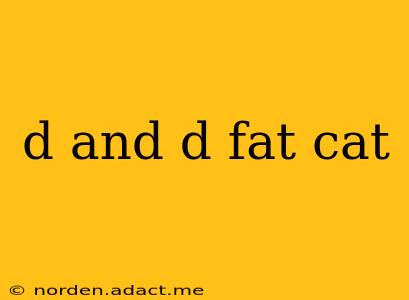D&D's Fat Cat: Exploring the Concept of Wealth and Power in Dungeons & Dragons
The term "fat cat" in Dungeons & Dragons (D&D) isn't an official designation, but it's a common descriptor for characters—and non-player characters (NPCs)—who have amassed significant wealth and influence. This isn't simply about having a lot of gold; it encompasses a lifestyle of luxury, political maneuvering, and often, a certain degree of moral ambiguity. Let's delve deeper into this fascinating archetype.
What Makes a D&D Character a "Fat Cat"?
A "fat cat" in D&D isn't just rich; they've leveraged their wealth to achieve a position of power and comfort. This could manifest in several ways:
- Opulence and Luxury: Think lavish mansions, exquisite clothing, a retinue of servants, and a penchant for fine dining and entertainment. Their possessions reflect their status and success.
- Political Influence: "Fat cats" often have connections to powerful figures, possibly holding official positions or subtly influencing political decisions. They may use bribery, blackmail, or other less-than-honorable tactics to maintain their standing.
- Economic Control: They might own businesses, control trade routes, or have significant investments in various ventures, giving them considerable economic power. This allows them to manipulate markets and influence the lives of others.
- Moral Ambiguity: While not inherently evil, "fat cats" are often willing to bend or break the rules to protect their interests. Their wealth may have been acquired through questionable means, or they may use their influence to exploit others.
How to Play a "Fat Cat" Character in D&D
Playing a "fat cat" character presents unique opportunities for roleplaying:
- The Reluctant Hero: Perhaps they initially resist getting involved in dangerous adventures, preferring the comfort of their opulent lifestyle. However, a compelling reason—threat to their wealth, a personal vendetta, or a genuine desire to do good—might compel them to act.
- The Corrupt Official: A "fat cat" could be a high-ranking official who uses their position to enrich themselves and further their own ambitions, even if it means sacrificing the well-being of others.
- The Philanthropic Tycoon: Alternatively, a "fat cat" could be a genuinely benevolent individual who uses their wealth to improve the lives of others through charitable works. This could create interesting conflicts and moral dilemmas.
How Can I Create a Rich Character in D&D?
Creating a wealthy character requires more than just assigning a high gold amount. Consider these aspects:
- Background: A noble birth, successful merchant family, or inheritance can all provide a starting point. Consider how their background shapes their personality and motivations.
- Skills and Abilities: Consider skills like Persuasion, Deception, and Insight, which are valuable for navigating social situations and maintaining influence.
- Connections: Establish connections with influential NPCs, guilds, or organizations that can aid your character's goals.
What are the Challenges of Playing a Wealthy Character?
Playing a wealthy character comes with its own set of challenges:
- Vulnerability: Their wealth makes them a target for thieves, assassins, and rivals. Protecting their assets and status requires careful planning and resourcefulness.
- Maintaining Appearances: Their lifestyle requires constant maintenance, and any slip-ups could expose their vulnerabilities.
- Moral Dilemmas: The temptations of power and wealth can lead to difficult choices, forcing them to confront their moral compass.
By thoughtfully developing their personality, motivations, and challenges, players can create memorable and engaging "fat cat" characters that add depth and complexity to their D&D campaigns. The key is to go beyond the superficial aspects of wealth and explore the complexities of power, influence, and morality that come with it.
